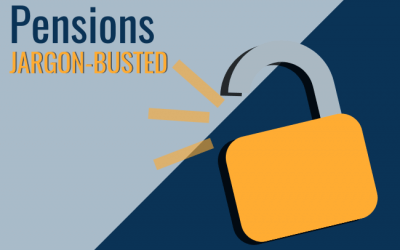No one should be deterred from planning for their retirement by the jargon used in the pension industry. Happily, we are well versed in turning complex financial terms into plain English. Here we unravel a couple of terms that you may have come across and be unclear about.
ANNUITIES
When you retire, you can choose to take some or all of your pension pot as an annuity, an insurance product that provides a guaranteed income for life. One of the benefits that annuities provide is security. Unlike other retirement income products, and with the exception of investment-linked annuities, you aren’t exposed to stock market risk which could erode your income. On the downside, should you die early, the residual value of the annuity dies with you; there is usually no return of capital to your estate.
PENSION INCOME DRAWDOWN
With income drawdown, you take a retirement income direct from your pension pot while leaving the rest of the cash invested, providing an opportunity for future growth.
There is no minimum amount for drawdown, so you could, for instance, take your 25% tax-free lump sum and choose to leave the remaining funds invested. You can also move funds into drawdown in stages, known as partial or phased drawdown.
The 25% tax-free amount doesn’t have to be taken at once on retirement – smaller amounts can be taken over time, each with 25% tax-free.
Once in drawdown you can access funds as you need them. You could, for example, vary the amount you take each year, taking less if you wish to remain in a lower tax band, or more if you have plans to spend.
After taking your 25% tax-free cash, your withdrawals will be subject to income tax and your drawdown income is added to any other income you receive in that tax year. It’s important to remember that taking large withdrawals may result in you paying tax at a higher rate.
Clifford Osborne are Independent Financial Advisors (IFA) based in Eastbourne, East Sussex, offering early retirement advice, pension advice, mortgage advice and more. Our clients often come from Uckfield, Lewes, Brighton, Tunbridge Wells, Hastings, Bexhill, Newhaven, Seaford, Crowborough and further afield.
Please read our VoucherFor reviews here.
The value of investments can go down as well as up and you may not get back the full amount you invested. The past is not a guide to future performance and past performance may not necessarily be repeated.
It is important to take professional advice before making any decision relating to your personal finances. Information within this blog is based on our current understanding of taxation and can be subject to change in future.
It does not provide individual tailored investment advice and is for guidance only. Some rules may vary in different parts of the UK; please ask for details. We cannot assume legal liability for any errors or omissions it might contain. Levels and bases of, and reliefs from, taxation are those currently applying or proposed and are subject to change; their value depends on the individual circumstances of the investor.
The value of investments can go down as well as up and you may not get back the full amount you invested. The past is not a guide to future performance and past performance may not necessarily be repeated.
If you withdraw from an investment in the early years, you may not get back the full amount you invested. Changes in the rates of exchange may have an adverse effect on the value or price of an investment in sterling terms if it is denominated in a foreign currency. Taxation depends on individual circumstances as well as tax law and HMRC practice which can change.
The information contained within the blog is for information purposes only and does not constitute financial advice.
The purpose of the blog is to provide technical and general guidance and should not be interpreted as a personal recommendation or advice.






